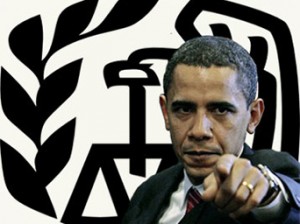When the House Ways & Means Subcommittee on Oversight grills the Internal Revenue Service’s John Koskinen next week about his scandal-plagued agency, it would do well to ask him to defend its proposed guidelines for the operation of “social welfare groups.” If finalized as written, these guidelines would effectively “gag” many organizations that engage in the nation’s policy discussions.
The IRS now claims that the targeting of conservatives was the result of ambiguous rules rather than a deliberate strategy to silence conservative groups that might oppose the Obama Administration’s policy objectives. While the IRS has been stonewalling Congress on the targeting scandal, it has been secretly preparing these new rules to expand its power and legalize its past abuses.
This is absurdly corrupt on its face. The same people who purposefully and illegally put their collective thumbs on conservative groups are now claiming to “fix” the problem. You don’t let the proverbial fox guard the hen house, or write new security procedures for the chicken coop. This is a sly, opportunistic power grab, nothing more. It is an attempt to legalize political corruption.
A surprising number of liberal groups, otherwise normally aligned with the Obama Administration, oppose these new rules because they understand that giving government the power to selectively silence and target groups based on the content of their speech is profoundly dangerous and violates fundamental American values found in the Constitution. These liberal groups who don’t like the new rules are getting enormous pressure from the White House to change their position on the new rules, something that in and of itself is instructive.
Under section 501(c)(4) of the tax code, a qualifying “social welfare” group must “operate primarily to further the common good and general welfare of the people.” Up to now the IRS has said that these groups can participate in some political or election oriented activity, as long as it is not their “primary” activity. Those who donate to such groups do not receive a tax deduction. These groups must disclose their large donors to the IRS, but not to the public.
The IRS is purposefully conflating electoral politics with public policy discussions and analysis. There is a big difference between the two. In electoral politics, one is working for, or against, the election of a candidate. But when discussing and analyzing public policy issues one is explaining the impact and analyzing the costs and benefits of a given proposal. The IRS’s new conflated view is in conflict with the rulings of the United States Supreme Court. The IRS’s new approach is designed to give them the power to silence many of those who discuss public policy issues. This is highly problematic.
The new rules will limit voter guides — informational materials that explain whether candidates voted for or against certain bills, or support or oppose certain proposals. They would also limit voter registration, and sponsoring candidate debates or forums, among other things.
The organization that I head would be governed and silenced by these new rules. We have never endorsed a candidate, or placed advertisements supporting or opposing candidates. We haven’t even sponsored debates or registered voters. We publish articles and studies and appear in the media to discuss and analyze constitutional and public policy issues. We sponsor briefings on issues with leading experts discussing the important issues of the day. We approach these issues from a perspective that values constitutionally limited government, that prefers private and free-market solutions over big-government solutions, and that believes that peace is best maintained by being strong economically and militarily.
These new rules will have the impact of limiting and chilling free speech and stopping robust debate. Why? Because public policy issues invariably have politicians on both sides. How does one discuss healthcare policy, foreign policy, tax or regulatory reform, or budget and spending issues, without mentioning the President or members of Congress or without looking at and evaluating the arguments made by politicians?
Under the proposed rules, one cannot be sure that an article or study published before an election or primary — that discusses and analyzes current policy issues, and refers to political figures discussing such issues — won’t be deemed prohibited “candidate-related political activity.” Will groups be required to stop discussing important constitutional or policy issues, or will they be so afraid of IRS sanctions that they simply steer clear of such issues? The answer is almost certainly, yes! This is precisely what the Administration and the IRS seek — the power to silence.
Ms. Lois Lerner, the high ranking IRS official who took the “Fifth” when testifying before Congress, had a history at both the FEC and the IRS of abusing her authority to harass and silence conservatives. Yet, an IRS rule that reduces thoughtful discussion and analysis of important issues will not benefit society. But it will benefit those within the IRS who seek the power to silence — people like Lois Lerner.
For the IRS to propose new rules that increase its power to act arbitrarily and stifle free speech in the name of “clarifying” things, not only violates the constitutional rights of every American, it will limit our public discourse and reduce meaningful debate by silencing — either through overt regulation or by chilling speech — those not favored at the IRS. If you don’t believe me, just ask Lois Lerner.
. . . . . . . . . . . . . . . . . .
George Landrith is the president of Frontiers of Freedom. This article was published at Townhall.com.

